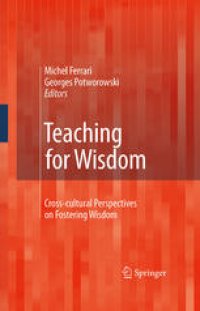
Ebook: Teaching for Wisdom: Cross-cultural Perspectives on Fostering Wisdom
- Tags: Education & Society, Philosophy of Education, Comparative Education, Pedagogic Psychology, Philosophy of Mind, Philosophy of Religion
- Year: 2009
- Publisher: Springer Netherlands
- Edition: 1
- Language: English
- pdf
Wisdom is valued as an ideal aim of personal development around the world. But we rarely see how wisdom is understood in different religious and philosophical traditions and different scientific disciplines, and more particularly how wisdom is taught. The emphasis of the book is on whether wisdom can be taught, not on what wisdom is, making it both more practical and more personally engaging. More specifically, it considers how people at different times and places have engaged the age-old question of how (or whether) we can learn to live a good life, and what that life is like. The chapters in this book area welcome introduction to this vast field from a variety of different perspectives. Chapters consider Greek and Confucian philosophy, Christian, Islamic and Buddhist religion, African tradition, as well as contemporary scientific approaches to the study of wisdom. Authors of each chapter are leading scholars in their respective fields, and representing a range of disciplines including philosophy, psychology, anthropology, and religion. Chapters are written to be accessible to a broad audience, not specialists. The book hopes to open a dialogue between experts in various fields about the complex and fascinating topic of wisdom and how it is understood, both historically and personally as a transformative force within people’s lives.
Wisdom is valued as an ideal aim of personal development around the world. But we rarely see how wisdom is understood in different religious and philosophical traditions and different scientific disciplines, and more particularly how wisdom is taught. The emphasis of the book is on whether wisdom can be taught, not on what wisdom is, making it both more practical and more personally engaging. More specifically, it considers how people at different times and places have engaged the age-old question of how (or whether) we can learn to live a good life, and what that life is like. The chapters in this book area welcome introduction to this vast field from a variety of different perspectives. Chapters consider Greek and Confucian philosophy, Christian, Islamic and Buddhist religion, African tradition, as well as contemporary scientific approaches to the study of wisdom. Authors of each chapter are leading scholars in their respective fields, and representing a range of disciplines including philosophy, psychology, anthropology, and religion. Chapters are written to be accessible to a broad audience, not specialists. The book hopes to open a dialogue between experts in various fields about the complex and fascinating topic of wisdom and how it is understood, both historically and personally as a transformative force within people’s lives.